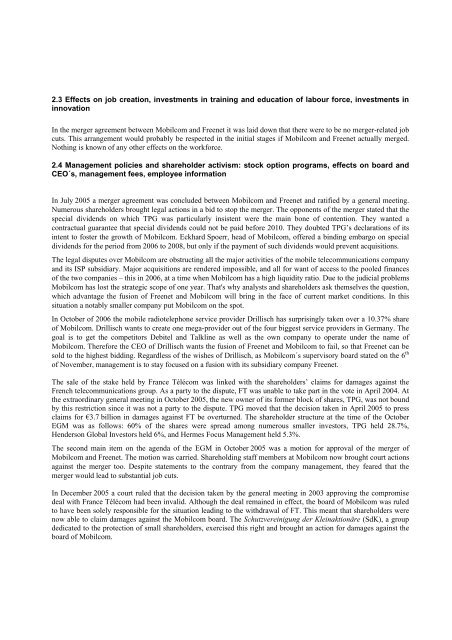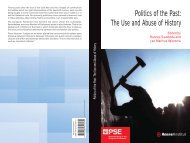Executive summary - Udo Bullmann
Executive summary - Udo Bullmann
Executive summary - Udo Bullmann
- No tags were found...
Create successful ePaper yourself
Turn your PDF publications into a flip-book with our unique Google optimized e-Paper software.
2.3 Effects on job creation, investments in training and education of labour force, investments ininnovationIn the merger agreement between Mobilcom and Freenet it was laid down that there were to be no merger-related jobcuts. This arrangement would probably be respected in the initial stages if Mobilcom and Freenet actually merged.Nothing is known of any other effects on the workforce.2.4 Management policies and shareholder activism: stock option programs, effects on board andCEO´s, management fees, employee informationIn July 2005 a merger agreement was concluded between Mobilcom and Freenet and ratified by a general meeting.Numerous shareholders brought legal actions in a bid to stop the merger. The opponents of the merger stated that thespecial dividends on which TPG was particularly insistent were the main bone of contention. They wanted acontractual guarantee that special dividends could not be paid before 2010. They doubted TPG’s declarations of itsintent to foster the growth of Mobilcom. Eckhard Spoerr, head of Mobilcom, offered a binding embargo on specialdividends for the period from 2006 to 2008, but only if the payment of such dividends would prevent acquisitions.The legal disputes over Mobilcom are obstructing all the major activities of the mobile telecommunications companyand its ISP subsidiary. Major acquisitions are rendered impossible, and all for want of access to the pooled financesof the two companies – this in 2006, at a time when Mobilcom has a high liquidity ratio. Due to the judicial problemsMobilcom has lost the strategic scope of one year. That's why analysts and shareholders ask themselves the question,which advantage the fusion of Freenet and Mobilcom will bring in the face of current market conditions. In thissituation a notably smaller company put Mobilcom on the spot.In October of 2006 the mobile radiotelephone service provider Drillisch has surprisingly taken over a 10.37% shareof Mobilcom. Drillisch wants to create one mega-provider out of the four biggest service providers in Germany. Thegoal is to get the competitors Debitel and Talkline as well as the own company to operate under the name ofMobilcom. Therefore the CEO of Drillisch wants the fusion of Freenet and Mobilcom to fail, so that Freenet can besold to the highest bidding. Regardless of the wishes of Drillisch, as Mobilcom´s supervisory board stated on the 6 thof November, management is to stay focused on a fusion with its subsidiary company Freenet.The sale of the stake held by France Télécom was linked with the shareholders’ claims for damages against theFrench telecommunications group. As a party to the dispute, FT was unable to take part in the vote in April 2004. Atthe extraordinary general meeting in October 2005, the new owner of its former block of shares, TPG, was not boundby this restriction since it was not a party to the dispute. TPG moved that the decision taken in April 2005 to pressclaims for €3.7 billion in damages against FT be overturned. The shareholder structure at the time of the OctoberEGM was as follows: 60% of the shares were spread among numerous smaller investors, TPG held 28.7%,Henderson Global Investors held 6%, and Hermes Focus Management held 5.3%.The second main item on the agenda of the EGM in October 2005 was a motion for approval of the merger ofMobilcom and Freenet. The motion was carried. Shareholding staff members at Mobilcom now brought court actionsagainst the merger too. Despite statements to the contrary from the company management, they feared that themerger would lead to substantial job cuts.In December 2005 a court ruled that the decision taken by the general meeting in 2003 approving the compromisedeal with France Télécom had been invalid. Although the deal remained in effect, the board of Mobilcom was ruledto have been solely responsible for the situation leading to the withdrawal of FT. This meant that shareholders werenow able to claim damages against the Mobilcom board. The Schutzvereinigung der Kleinaktionäre (SdK), a groupdedicated to the protection of small shareholders, exercised this right and brought an action for damages against theboard of Mobilcom.





